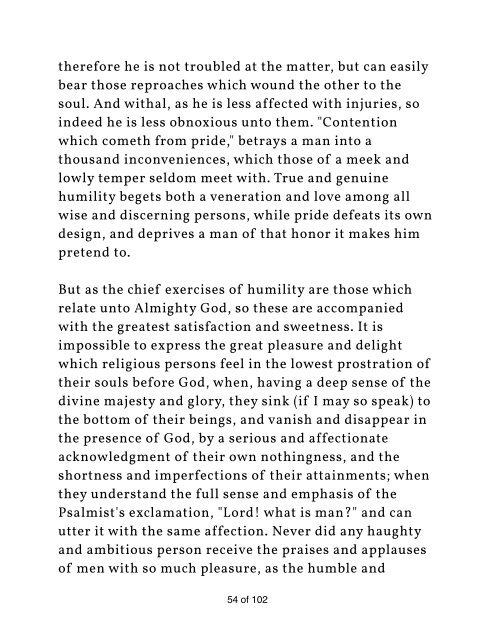The Life of God in the Soul of Man by Henry Scougal
The book instrumental in George Whitefield’s conversion The Life of God in the Soul of Man (1677), was originally written as a private letter to a ‘dear’ friend, to explain Christianity. It was never intended for publication. Yet it has become a classic Puritan text and one of the most read and influential treatises ever written for the comfort of God’s saints.
The book instrumental in George Whitefield’s conversion The Life of God in the Soul of Man (1677), was originally written as a private letter to a ‘dear’ friend, to explain Christianity. It was never intended for publication. Yet it has become a classic Puritan text and one of the most read and influential treatises ever written for the comfort of God’s saints.
Create successful ePaper yourself
Turn your PDF publications into a flip-book with our unique Google optimized e-Paper software.
<strong>the</strong>refore he is not troubled at <strong>the</strong> matter, but can easily<br />
bear those reproaches which wound <strong>the</strong> o<strong>the</strong>r to <strong>the</strong><br />
soul. And withal, as he is less affected with <strong>in</strong>juries, so<br />
<strong>in</strong>deed he is less obnoxious unto <strong>the</strong>m. "Contention<br />
which cometh from pride," betrays a man <strong>in</strong>to a<br />
thousand <strong>in</strong>conveniences, which those <strong>of</strong> a meek and<br />
lowly temper seldom meet with. True and genu<strong>in</strong>e<br />
humility begets both a veneration and love among all<br />
wise and discern<strong>in</strong>g persons, while pride defeats its own<br />
design, and deprives a man <strong>of</strong> that honor it makes him<br />
pretend to.<br />
But as <strong>the</strong> chief exercises <strong>of</strong> humility are those which<br />
relate unto Almighty <strong>God</strong>, so <strong>the</strong>se are accompanied<br />
with <strong>the</strong> greatest satisfaction and sweetness. It is<br />
impossible to express <strong>the</strong> great pleasure and delight<br />
which religious persons feel <strong>in</strong> <strong>the</strong> lowest prostration <strong>of</strong><br />
<strong>the</strong>ir souls before <strong>God</strong>, when, hav<strong>in</strong>g a deep sense <strong>of</strong> <strong>the</strong><br />
div<strong>in</strong>e majesty and glory, <strong>the</strong>y s<strong>in</strong>k (if I may so speak) to<br />
<strong>the</strong> bottom <strong>of</strong> <strong>the</strong>ir be<strong>in</strong>gs, and vanish and disappear <strong>in</strong><br />
<strong>the</strong> presence <strong>of</strong> <strong>God</strong>, <strong>by</strong> a serious and affectionate<br />
acknowledgment <strong>of</strong> <strong>the</strong>ir own noth<strong>in</strong>gness, and <strong>the</strong><br />
shortness and imperfections <strong>of</strong> <strong>the</strong>ir atta<strong>in</strong>ments; when<br />
<strong>the</strong>y understand <strong>the</strong> full sense and emphasis <strong>of</strong> <strong>the</strong><br />
Psalmist's exclamation, "Lord! what is man?" and can<br />
utter it with <strong>the</strong> same affection. Never did any haughty<br />
and ambitious person receive <strong>the</strong> praises and applauses<br />
<strong>of</strong> men with so much pleasure, as <strong>the</strong> humble and<br />
54 <strong>of</strong> 102

















